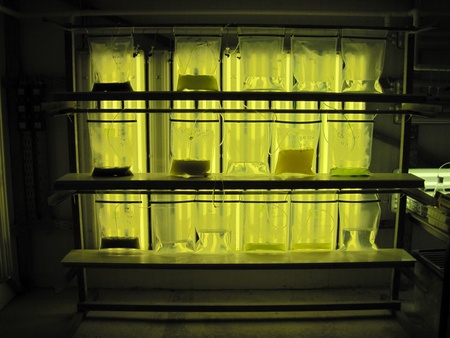The answer to society’s fuel demands could literally be all around us according to Aberdeen scientists – in fact it makes up two thirds of the planet’s surface.
An international research team led by the University of Aberdeen is hoping to make biofuels out of microscopic algae found in the world’s oceans and seas.
Currently biofuels are created from crops and land-based vegetation – something project coordinator Dr. Oliver Ebenhoeh, from the University of Aberdeen’s Institute of Complex Systems and Mathematical Biology, says is not sustainable.
He said: “We need to find efficient ways of supplying our energy demand in a way that doesn’t compete for valuable resources like arable land or fresh water.
“We can’t just put corn in your car’s gas tank because it’s being used to feed millions already - it won’t be sustainable. This is one of the key motivations to look into marine microalgae.
“Cultivating algae using water that can’t be used for irrigation, like salt water or brackish water, makes sense because it’s so vast – it’s all around us and there’s no competition to use the land to grow other things.”
The AccliPhot project is due to run for four years and is backed by €4million of EU funding and involves 12 partners from across the continent.
Today First Minister Alex Salmond praised the initiative.
He said: "Scotland is leading the way in the energy sector, with our world class oil and gas industry now allied to a vibrant renewables sector that is harnessing the power of our boundless wind and water resources to bring jobs and investment to our country and ensure we can power our nation on a sustainable basis.
"The AccliPhot project could herald another exciting development in Scotland's energy story with the team at the University of Aberdeen using cutting-edge techniques to support the development of a sustainable biofuel from microscopic algae.
"In many ways, these researchers are ideally placed to undertake this work, being based in a city that has a magnificent heritage in the offshore industry. I would like to extend my best wishes to the team for this exciting project and I look forward to hearing the results."
The team will try to understand more fully how plants and microalgae respond to changes in light and other conditions and use that information to make new products.
Whilst the main focus is on biofuels the study could also yield breakthroughs in antibiotics, nutritional supplements or even produce chemical compounds used in the cosmetics industry.
Dr Ebenhoeh added: “We’re hoping to understand the principles that guide these changes to environments and then see if this can be scaled up to industry scale. If that is successful then the applications are enormous because then you can really look into targeted pharmaceuticals or precursors for the chemical industry.”
Micro algae eat nothing but carbon dioxide, light and some minerals. Cells of microalgae typically measure between a few to several hundred micrometers across and can be grown in vast numbers in giant 10,000 litre water tanks called photo-bioreactors. So if they can be successfully cultivated to make biofuels they could contribute hugely to the planet’s energy consumption.
Dr Ebenhoeh says his team will be able to tackle the research in a way no one else has because of the diverse background of the team members.
He commented: “One of our unique points is our multidisciplinary approach. We have theoreticians with a background in mathematics and physics, working together with biologists and biochemists and three of our partners perform industrial research. This unique composition will help us form a tight connection between academic and industrial research. We hope to make a considerable contribution to the understanding in this field.”
ENDS


